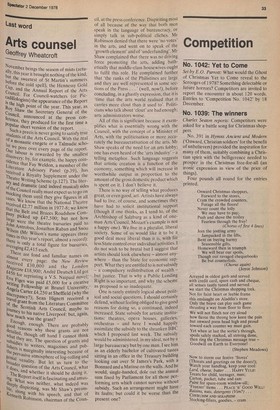Last word
Arts counsel
Geoffrey Wheatcroft
November brings the season of mists (actually, this year it brought nothing of the kind, but the sweetest of St Martin's summers before the cold spell), the Hennessy Gold Cup, and the Annual Report of the Arts Council. For Council-watchers (or Pic cadillologists) the appearance of the Report iS the high point of the year. This year, as ROY Shaw the Secretary General of the Council, announced at the press conference, they produced for the first time a Popular short version of the report. Such a precis is never going to satisfy true students of the Arts Council. With the zeal of a monastic exegete or a Talmudic scholar we pore over every page of the report. Our labour is rewarded by the smallest discovery: by, for example, the happy cidence that Fay Weldon, a member of the Literature Advisory Advisory Panel (p.39), has received a Royalty Supplement under the Theatre Writing Scheme (p.127). The literary and dramatic (and indeed musical) sides of the Council really must expect us to go Oil mocking them until they give figures in all eases. We know that the National Theatre received 12.77 million in 1977-8; we know that the Belt and Braces Roadshow Company picked up £47,500; but not how large were the theatre bursaries paid to John Antrobus, Jonathan Raban and Snoo .W. ilson (Mr Wilson's name appears three !nines in this year's report, almost a record): there is only a total figure for bursaries, averaging £2,415 each. There are fond and familiar names on altnost every page: the New Review received £30,000 and the London A.rlagazine £18,900; Andre Deutsch Ltd got e50 for reprinting a V.S. Naipaul novel; "a Figes was paid £5,000 for a creative writing Fellowship at Brunel University, Angels Carter £4,250 at Sheffield (why the triscrePancy?); Sean Hignett received a 'ayel grant from the Literature Committee o. f the Scottish Arts Council, maybe to 113urney to his native Liverpool: but, again, 'low much was the grant? Enough, enough. There are probably reod reasons why these grants are not detailed though off hand I cannot think What they are. The question of grants and w ?sidies to writers, magazines and pubhers is marginally interesting because of 'le Pervasive atmosphere of log-rolling and tenial venality. But let us turn to the itro_,ader question of the Arts Council, what does, and whether it should be doing it. , in he Report itself is fascinating and amusdt What was neither, what indeed was ePly dispiriting, was Mr Shaw's pream1,1e, along with his speech, and that of t"enneth Robinson, chairman of the Coun cil, at the press conference. Dispiriting most of all because of the way that both men speak in the language of bureaucracy, or simply talk in sub-political cliches. Mr Robinson denied that there were 'no votes' in the arts, and went on to speak of the 'growth element' and of 'underfunding'. Mr Shaw complained that there was no driving force promoting the arts, adding bathetically that middle-class housewives ought to fulfil this role. He complained further that 'the ranks of the Philistines are large and they are well represented in some sections of the Press. . . '(well, now!), before concluding, in a ghastly expression, that it is 'time that the arts world realised that it carries more clout than it used to'. Politicians who talk about 'clout' are bad enough; arts administrators worse.
All of this is significant because it exemplifies what is essentially wrong with the Council, with the concept of a Minister of Arts, with the politicisation or more accurately the bureaucratisation of the arts. Mr Shaw speaks of the need for an arts lobby; one has even heard of the 'arts industry' a telling metaphor. Such language suggests that artistic creation is a function of the economy, something which will increase in worthwhile output in proportion to the amount of the gross domestic product which is spent on it. I don't believe it. There is no way of telling what produces great, or even good, art. Artists have always had to live, of course, and sometimes they have had to solicit institutional support (though if one thinks, as I tend to, of the Archbishop of Salzburg as a kind of one man Arts Council, Mozart's example is not a happy one). We live in a pluralist, liberal society. Some of us would like it to be a good deal more liberal than it is, with far less State control over individual activities. I do not wish to be brutal but I suggest that artists should look elsewhere — almost anywhere — than the State for economic sup port. What they are entitled to is not subsidy — a compulsory redistribution of wealth — but justice. That is why a Public Lending Right is so important, and why the scheme as proposed is so inadequate. One is rarely entirely logical about political and social questions. I should certainly defend, without feeling obliged to give good reasons for doing so, a continued, indeed increased, State subsidy for artistic institu tions: theatres, opera houses, galleries, orchestras — and here I would happily assimilate the subsidy to the shrunken BBC which I proposed last week. The subsidy would he administered, in my ideal, not by a large bureaucracy but by one man. I see him as an elderly bachelor of cultivated tastes sitting in an office in the Treasury building looking out over St James's Park, with a Bonnard and a Matisse on the walls. And he would, single-handed, dole out the annual sum fixed by Parliament for all those performing arts which cannot survive without subsidy. Such an arrangement might have its faults; but could it be worse than the present one?






































 Previous page
Previous page